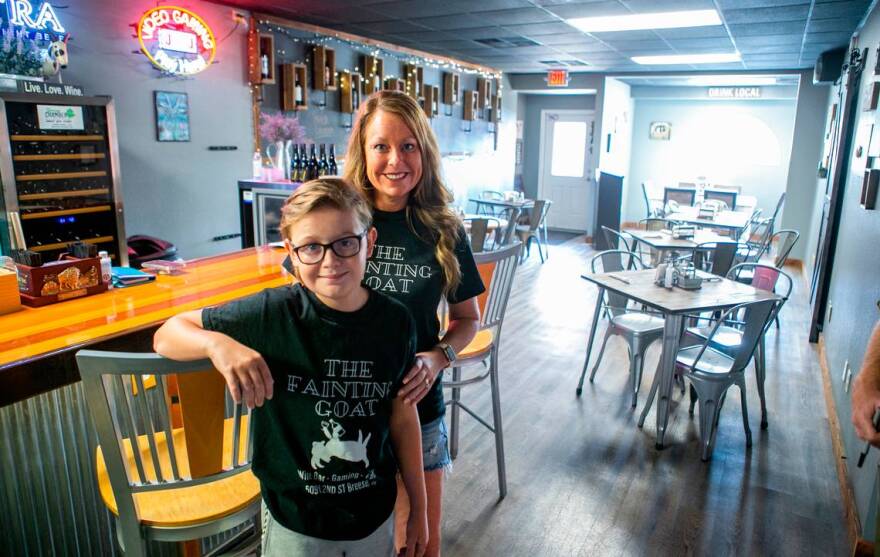BREESE — Ashley and Ryan Driemeyer are in a rebellious mood.
The Driemeyers continue to serve customers inside their two restaurants in Breese and Pocahontas in defiance of Gov. J.B. Pritzker’s directive issued on Sept. 1 for Metro East bars and restaurants to stop indoor service because the southwestern Illinois region’s positivity rate for coronavirus tests surpassed 8%.
The positivity rate continues to surge in Clinton County, says the health department spokeswoman, because the public hasn’t heeded Centers for Disease Control and Prevention recommendations and the department has no means of enforcing them.
Pritzker on Thursday agreed, saying the Metro East continues to fail at its efforts to reduce the number of COVID-19 cases, while another Illinois region in Will and Kankakee counties was on the path to having restrictions lifted.
“Mr. Pritzker doesn’t pay my bills,” Ashley Driemeyer said. “If he would like to come down here and pay them for me and then shut me down, that would be a different story.
“I can’t take it anymore,” she said. “I just have too much on the line.”
The Driemeyers established The Fainting Goat bar and restaurant at 509 N. Second St. in Breese last year, and earlier this month, just as the latest ban on indoor service was issued, they opened The Fainting Goat - Pocahontas/Interstate 70 in the former Lucky Jacks site at 408 W. Johnson St.
“Ridiculous” is how Ryan Driemeyer summed up the latest mitigation measures from the state.
The new rules for bars and restaurants include:
- No indoor service permitted. Takeout and outdoor service is allowed.
- No dancing.
- Reservations required for each party.
- All bars and restaurants must close at 11 p.m.
- Video gaming permitted to continue.
The first full day for the new rules was Sept. 2. They are targeted at the bars and restaurants in what the state calls Region 4, which covers seven Metro East counties: St. Clair, Madison, Bond, Clinton, Monroe, Randolph and Washington.
The Driemeyers’ two restaurants are in Region 4, with the Breese location in Clinton County and the Pocahontas site in Bond County.
Ashley Driemeyer said other bar and restaurant owners in the area also are still serving customers inside. She is a longtime friend of Bond County attorney Tom DeVore, who has filed multiple lawsuits against Pritzker alleging the governor does not have the authority to issue orders for multiple months during the COVID-19 pandemic.
DeVore met with area bar and restaurant owners last week and received applause when he said, “If enough of you stay open, this is over,” according to the Times-Tribune newspaper in Troy.
And in a Facebook post on Tuesday, DeVore wrote: “I have yet to have a health department try and shut down a client for indoor dining. Business owners need to watch what’s going on around them. It’s a big shell game everybody!!”
DeVore ended his post by saying that “people aren’t dying at a rapid pace” of the coronavirus after eating in bars and restaurants.

Positivity rate for COVID-19
The decision to maintain indoor service in the Metro East flies in the face of guidelines from public health experts.
Clinton County Health Department spokeswoman Louise McMinn said the county’s positivity rate for COVID-19 tests is rising completely from community spread, meaning people don’t know where or how they got the virus. She said many of the cases are being tracked back to social events and gatherings.
That’s happening due to a lack of buy-in from “frustrated” Clinton County residents, McMinn said.
“We do not have a lot of support from the community as far as following guidance goes,” McMinn said. “There is a lot of frustration in our community, so I think that’s playing into where our positivity rate is coming from.”
On top of that, the health department has no way to enforce the guidelines if individuals or businesses do not follow the implemented restrictions, McMinn said.
In recent weeks and especially over the Labor Day weekend, the department received reports of businesses ignoring the state’s order, she said.
All the department can do, she said, is offer guidance.
“Unfortunately, on a local level it’s guidance,” she said. “We can offer that guidance, but as far as going in and enforcing it, we have no real way of doing that.”
The Belleville News-Democrat reached out to the Clinton County Sheriff’s Department for comment on whether the department was actively enforcing or intervening when restrictions are being ignored. The department had not responded as of Friday.
Clinton County’s positivity rate rose from a roughly .70 seven-day rolling average positivity rate in early August to a 16.9% positivity rate on Friday, making it the county with the second-highest rate in Region 4, according to the latest available data from the state.
The positivity rate is the percentage of coronavirus tests that come back positive.
Nicholas Dean Soulakis, an assistant professor of preventive medicine at Northwestern University, announced on Sept. 2 that contact tracing determined that over 1,400 COVID-19 cases and contacts had been linked to people who had been in bars and restaurants in the previous 60 days.
“Public health experts agree, this virus spreads easily and there’s potential for substantial asymptomatic spread in close quarters,” Soulakis said in a news conference.
And in a new study of 314 adults who were tested for COVID-19, the CDC found the persons who tested positive were about twice as likely as those who tested negative to have gone to a restaurant, McClatchy News reported Thursday.
Public health officials are battling a virus that is linked to over 193,000 deaths nationwide and over 8,500 in Illinois, according to the COVID Tracking Project and Johns Hopkins University.
Nineteen deaths and 938 positive cases have been reported in Clinton County and four deaths and 234 cases reported in Bond County as of Friday. The Driemeyers have restaurants in each.
Elsewhere in the Metro East as of Friday, there have been 179 deaths in St. Clair County with 6,583 cases; 114 deaths in Madison County with 4,723 cases; 14 deaths in Monroe County with 568 cases; eight deaths in Randolph County with 847 cases, and one death in Washington County with 149 cases.
Legal battle over orders
The lawsuits filed by DeVore are pending in circuit court in Sangamon County after the state Supreme Court ordered that the cases be consolidated in Springfield.
DeVore has argued that Pritzker does not have the authority to restrict businesses with continuing orders and directives, while the state attorney general’s office has said Pritzker has legal power to take such actions under the Illinois Emergency Management Agency Act.
Scott Szala, an adjunct professor in the University of Illinois College of Law, said he agrees with the attorney general’s office on this issue.
“It’s certainly my legal opinion that it’s a valid legal opinion from the governor under the Illinois Emergency Management Act,” said Szala, who noted he was giving his personal view and not speaking on behalf of the university.
Szala said he empathizes with restaurant owners such as the Driemeyers.
“The difficulty is you have to weigh property damage versus loss of life,” he said. “This issue has gone on now for months and months and we don’t have a vaccine, we don’t have a cure, and between those two things normally life wins out.”
Szala said ultimately he expects the lawsuits involving coronavirus orders to be considered by the state’s appellate court and Supreme Court.

Restaurants deal with indoor dining ban
The Driemeyers, like thousands of restaurant owners across the state, shut down their indoor dining in March as Pritzker ordered.
They participated in the federal Paycheck Protection Program during the shutdown, but the aid was for their employees and not for the owners. Also, they could not get insurance coverage for the products lost during the shutdown.
Ryan Driemeyer, who is a farmer in Bond County, said that they spent $5,000 to improve the patio with a 40-foot carport roof at their Breese location and that offering carryout service only is not cost effective.
Now, after reopening in June, they believe they can safely serve their customers and keep their employees on the payroll.
“I have employees that rely on this income,” said Ashley Driemeyer, who also is an insurance agent in Highland. “I rely on this income. Just because the governor decides to shut businesses down doesn’t mean the bills don’t stop coming in. I still have to pay my mortgage and my car payment and provide for my children.
“We just decided we’re not going to take it anymore,” she said. “I think all the bar and restaurant owners in this area have all come to an agreement that we’re going to keep our doors open. You know, unless they forcibly come in and require us to close, we’re going to keep running this business as usual.”
Ashley Driemeyer said customers should be able to decide whether they want to go inside her restaurants.
“I believe if somebody is at risk, then they know to stay at home,” she said. “Most people can make that decision themselves whether they feel comfortable wearing a mask, not wearing a mask, coming out to dine inside or outside.”
She argues that America is based on giving citizens the freedom to choose their way of life.
“To see those kinds of things taken away from us right now, it’s disheartening that we have such a tyrannical government right here in the state of Illinois.”
Mike Koziatek and Kavanh Mansouri are reporters with the Belleville News-Democrat, a news partner of St. Louis Public Radio. BND reporter Kelsey Landis contributed information for this article.



